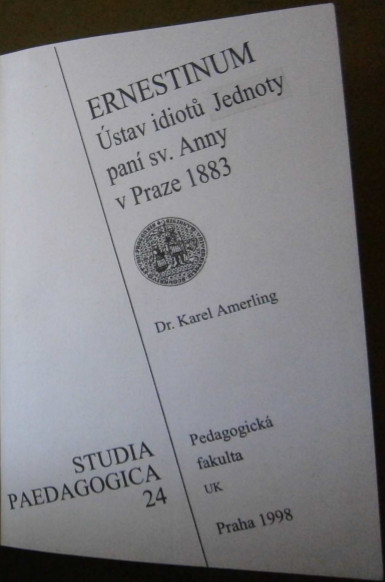Karl Amerling: Die Idiotenanstalt des Sct. Anna-Frauen-Vereins in Prag vom Jahre 1871-1883 (1883/1998) [German/Czech]
Filed under book | Tags: · 1870s, 1880s, biology, pedagogy, psychiatry

“Ernestinum, jinak Ústav idiotů Jednoty paní sv. Anny v Praze, byl ústav pro choromyslné, který založil Karel Slavoj Amerling 17. června 1871 v Praze. Sídlil nejprve v Kateřinské ulici na Novém Městě Pražském, už 1. listopadu téhož roku se ale přestěhoval do svého nového útočiště, Šternberského paláce na pražských Hradčanech (dnes jedna z poboček Národní galerie).
Amerling o chodu ústavu napsal (německy, protože nevěřil v odpovídající ohlas v češtině) práci Die Idiotenanstalt des Sct. Anna-Frauen-Vereines in Prag nach ihrem zwölfjährigen Bestande vom J. 1871-1883, do češtiny byla přeložena až roku 1997 Janou Kepartovou. Jde o neobyčejně náročný text, neboť Amerling používá mnoho vlastních neologismů, do nichž promítá své rozsáhlé vzdělání – např. jeho vlastní metody diasofie (průvěda, něm. Orientierungslehre) a mathese; dále pojmy jako dioikete, edentát, archonom, exilast, chrémat (výrobní pud), makropelmus (jedinec s nezvykle širokýma nohama a podobnýma rukama), psychozot, proterot (‘upovídaný, zbrklý blázen’), hyperkinet (‘němý, neklidný běžec’) aj.
Podle Amerlinga se lidský život dělí do dvanácti fází po sedmi letech, přičemž ‘všechny roky po ukončení 84. roku života jsou mimořádné a taktéž všechny roky před 84. rokem života, neboť životní řád obnáší přesně dvanáctkrát sedm let.’
Během existence ústavu se v něm vystřídalo asi 166 chovanců (mužů i žen), ročně od šesti (v Kateřinské ulici) do šedesáti roku 1883.” (from Wikipedia)
German edition
Self-published, Prague, 1883
152 pages
via Eťa Kazmuková
Czech edition: Ernestinum: Ústav idiotů Jednoty paní sv. Anny v Praze: stav po 12 letech trvání (1871–1883)
Translated by Jana Kepartová
Publisher Pedagogická fakulta Univerzity Karlovy, Praha, 1998
Studia Paedagogica 24
ISBN 8086039447
132 pages
wikipedia (CZ)
PDF (German, no OCR)
PDF (Czech, no OCR)
Viktor Tausk: On the Origin of the “Influencing Machine” in Schizophrenia (1919/1933)
Filed under paper | Tags: · influencing machine, machine, psychiatry, psychoanalysis, schizophrenia

“On the Origin of the ‘Influencing Machine’ in Schizophrenia is a highly influential article written by psychoanalyst Viktor Tausk.
The paper describes Tausk’s observations and psychoanalytic interpretation of a type of paranoid delusion that occurs in patients diagnosed with schizophrenia. The delusion often involves their being influenced by a ‘diabolical machine’, just outside the technical understanding of the victim, that influences them from afar. It was typically believed to be operated by a group of people who were persecuting the individual, whom Tausk suggested were “to the best of my knowledge, almost exclusively of the male sex” and the persecutors, “predominantly physicians by whom the patient has been treated”.
These delusions are known in contemporary psychiatry as ‘passivity delusions’ or ‘passivity phenomena’ and are listed among Kurt Schneider’s ‘first rank’ symptoms which are thought to be particularly diagnostic of schizophrenia, and still form some of the core diagnostic criteria.” (from Wikipedia)
Originally published in the journal Internationale Zeitschrift für Psychoanalyse, 1919.
Translated from German by Dorian Feigenbaum
Published in Psychoanalytic Quarterly, 2, 1933, pp 519-556
Republished in Journal of Psychotherapy Practice and Research, Vol 1, No 2, Spring 1992, pp 184-206
Image courtesy Zoe Beloff
artwork by Zoe Beloff inspired by the case (2001)
animated video by Brooke Gladstone and Benjamin Arthur explaining the case (2011)
article by Christopher Turner (Cabinet, 2004)
Gary Genosko (ed.): The Guattari Reader (1996)
Filed under book | Tags: · assemblage, capitalism, desire, ecology, machine, philosophy, politics, psychiatry, psychoanalysis, schizoanalysis, subjectivity

Félix Guattari (1930-1992) was a radical analyst, social theorist and activist-intellectual. Best known for his collaborations with the philosopher Gilles Deleuze on Anti-Oedipus, A Thousand Plateaus and What is Philosophy?, The Guattari Reader makes available for the first time the broad canvas of Guattari’s formidable theoretical and activist writings, many previously untranslated, to provide an indispensable companion to the existing literature.Aside from illustrating the salience of Guattari’s collaborative work with Deleuze and other European intellectuals, this volume charts Guattari’s own solo writing career – from his tenure as Lacan’s analysand in the 1950s and his prominent role in the international anti-psychiatry movement of the 1960s through his participation in queer politics, outlaw radio, and the formation of subversive collective organizations. This volume provides an important register of Guattari’s more political side, documenting his interventions in particular political conflicts in contemporary Europe. Guattari’s ideas and projects defy disciplinary boundaries and escape compartmentalization. They will appeal to those working in and between politics, philosophy, semiotics, psychoanalysis, sociology, and cultural studies.
Publisher Blackwell Publishers, 1996
ISBN 0631197079, 9780631197072
304 pages

